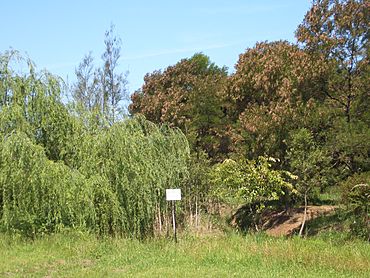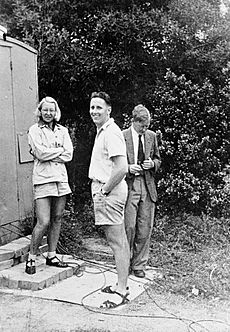Potts Hill, New South Wales facts for kids
Quick facts for kids Potts HillSydney, New South Wales |
|||||||||||||||
|---|---|---|---|---|---|---|---|---|---|---|---|---|---|---|---|

Potts Hill bushland
|
|||||||||||||||
| Population | 893 (2016 census) | ||||||||||||||
| Postcode(s) | 2143 | ||||||||||||||
| Elevation | 57 m (187 ft) | ||||||||||||||
| Location | 21 km (13 mi) south-west of CBD | ||||||||||||||
| LGA(s) | City of Canterbury-Bankstown | ||||||||||||||
| State electorate(s) | Bankstown | ||||||||||||||
| Federal Division(s) | Blaxland | ||||||||||||||
|
|||||||||||||||
Potts Hill is a suburb located in Sydney, New South Wales, Australia. It's about 21 kilometres south-west of the main city centre. This area is part of the City of Canterbury-Bankstown.
Potts Hill shares its postcode of 2143 with nearby suburbs like Regents Park and Birrong. A big part of Potts Hill is taken up by the Potts Hill Reservoir. This important reservoir is owned and run by Sydney Water, which provides water to the city.
Contents
History of Potts Hill
Potts Hill is named after Joseph Hyde Potts. He was an accountant who worked at the Bank of New South Wales. In 1833, he was given a large piece of land, about 1,100 acres. He first called his property Hyde Park. By 1835, his land had grown to 2,564 acres.
Two big reservoirs were built here. They were constructed between 1888 and 1923. These reservoirs became a key part of Sydney's water supply system.
Heritage-Listed Sites
Potts Hill has several places that are protected because of their historical importance. These include:
- Pressure Tunnel and Shafts
- Cooper Road: Potts Hill Reservoirs 1 and 2
Potts Hill Migrant Camp
After World War II, many people from Europe needed new homes. They were called displaced persons. From 1948 to 1955, a special camp was set up in Potts Hill. This camp was for European migrant workers. These workers came from countries like Poland, Czech Republic, Lithuania, and Ukraine. They were brought to Australia to help rebuild the country.
The workers helped build the City Water Tunnel. This tunnel carries water from Potts Hill to Waterloo in Sydney. Because the camp was close to Regents Park, it was also known as the Regents Park migrant camp.
Life at the Camp
Life at the Potts Hill camp was quite basic. It was often called "tent city" because many workers lived in tents. Some of the huts were old and needed repairs. There wasn't much hot water or enough showers. In 1951, nearly 1,000 men lived there.
Workers' wives could only visit on Sundays for a few hours. This made it hard for families to see each other. Sometimes, married couples didn't see each other for months. The workers also faced some challenges from local union members.
Potts Hill Radio Astronomy Station

In 1948, a science group called the Division of Radiophysics, part of the CSIRO, got permission to use land near the Potts Hill reservoir. They set up a field station there. Scientists used the area around the No. 1 reservoir for their special antennas.
By 1952, this became the group's biggest field station. They had different types of equipment, including large antennas and dishes. These tools helped them study radio waves from the sun and space. The station operated until 1962. After that, its work moved to other locations.
Population Information
In the 2016 Census, there were 893 people living in Potts Hill.
- About 39.6% of the people were born in Australia.
- Around 20.0% of people spoke only English at home.
- Other languages spoken at home included Korean, at 13.7%.
- The most common religions were Islam (19.7%), No Religion (18.5%), and Catholic (16.4%).
Potts Hill in Popular Culture
The movie Mad Max: Fury Road, which came out in 2015, was partly filmed in Potts Hill.
 | Janet Taylor Pickett |
 | Synthia Saint James |
 | Howardena Pindell |
 | Faith Ringgold |

